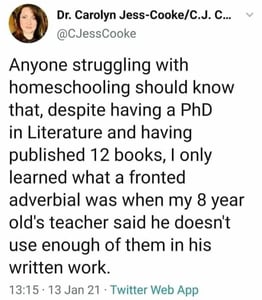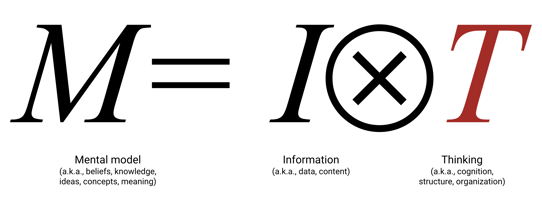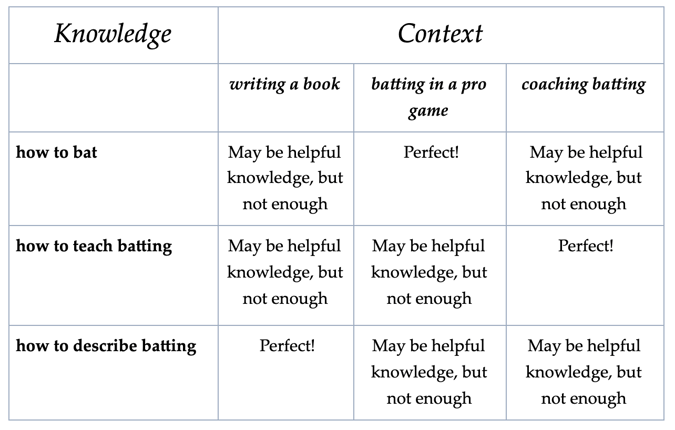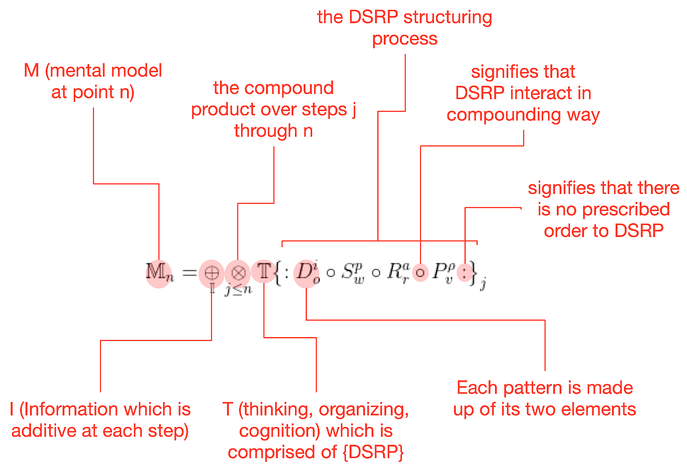The Curious Case of the Fronted Adverbial
Before the tweet below, I didn't know what a fronted adverbial was.

It turns out that there's a name for a literary technique (most of us use often) when we put some words or phrase at the front of a sentence, that provide contextual preamble to the action that follows. That technique's name is a fronted adverbial. Here are a few examples of fronted adverbials:
Slowly, he opened the crate.
Before the game, Sasha ate her breakfast.
After the rain, the grasses flourished.
Before the tweet above, I didn't know what a fronted adverbial was.
So there's your English lesson for today. But it turns out there's another lesson here about how knowledge works. An important lesson.
You see, Dr. Jesse-Cooke's tweet makes something clear. She knew what a fronted adverbial was long before her experience with her 8 year old's teacher. Because it is extremely likely, having written 12 books, that she used fronted adverbials possibly hundreds of times without knowing them by name. So, she knew how to use a fronted adverbial, she just didn't know what it was called. And, this very slight but important difference elucidates the point: knowledge is knowledge is knowledge.
There aren't different kinds (e.g., types, categories) of knowledge; certainly not in the sense of whether we value one category of knowledge over others. Knowledge is knowledge is knowledge. It's value depends on who needs it, for what purpose, when, and in what context. For example, we may laugh a little at the idea of a teacher getting 8th graders to use more fronted adverbials. I do, I admit it. But, from the teacher's perspective, it's important to help 8th graders to write well, and fronted adverbials—whether or not you know them by name—are one aspect of learning to write well. As a result, a teacher has to make the use of fronted adverbials explicit so students can use more of them. Knowing the name of them and how to use them therefore becomes important. You have to know how to do fronted adverbials and it won't hurt to also know their name. But those two knowings, are not the same knowings. One is knowing how to do the thing and the other is knowing how to name the thing [FN1].
I often call out pseudo-scientific educational 'theories' that have little to no evidence supporting them (i.e., causing one to question their validity and reliability) [FN2]. The usual suspects include some of the most popular educational frameworks including:
- Maslow's Hierarchy of Needs: there has been some recent work on the ideas behind Maslow's that do show promise (See [1]), but its nowhere near the Hierarchy model that has become so popular.
- Multiple Intelligences (MI): It really isn't a 'theory' because there is little to no evidence it exists and, like Bloom's, not for lack of trying.
- Bloom's Taxonomy: Even the updated version has very little basis in fact (indeed, it is Bloom's that spawns other nonsensical models like KSA and KASE),
Now we can add another hotshot educational concept to the list of pseudo-scientific flops: Knowledge, Skills, and Abilities (KSA) or its twin, Knowledge, Skills, and Abilities, and Experiences (KASE). Or Knowledge, Attitudes and Skills (KAS) and its extension with Habits (KASH).
- Knowledge: These models treat knowledge as information, which it is certainly not. Knowledge is synonymous with mental models. When we 'know' something, we act as if is true. I’ve written about the enactment of mental models here. We can know things in our heads and in our bodies. We can know how to taste wine and know how to describe how to taste wine. Those are different knowings.
- Skills and Abilities: aside from the fact that skills and abilities are synonyms, many frameworks treat them as if they are different. Again, you can know how to bat which occurs across the body and mind. You can know how to taste wine which involves tongue/taste and brain and nose/smell knowing. Both are skills and abilities. So is knowing how to say the words fronted adverbial. That’s a skill and an ability: I can say the words or I can’t. People with certain types of head injuries need to relearn (re-know) how to say words.
- Attitudes: what’s an attitude or a disposition but a mental model playing itself out? If I have a positive attitude perhaps it’s because I know that things work out most of the time, or because I know that things that seem bad can often have a silver lining. It could simply be that I know research shows that a positive attitude will pay off in various benefits. Thus, my attitude is a skill that may be contained in my brain and body. It’s an enactment of a bunch of knowings. Knowing is always enacted, that's what makes it knowing.
- Habits: a habit is just a knowing that is repeated. You can know an answer during a test but not a day later. You can know that something is important but not know how to manifest that important knowledge in your everyday existence. Those are different types of knowing. Knowing how to develop a habit vs being able to do it one time is different knowing. I may know how to exercise but not know how to exercise habitually. Those are different knowings.
The reason that KSA and KASE, KAS and KASH, should be tossed in to the dustbin of educational theory and practice is that they are incoherent. Knowledge is knowledge is knowledge. Knowledge is information structured or organized in a way (using DSRP) to be meaningful. Knowledge is synonymous with a mental model, idea, concept, etc.
It is surely true that knowledge of the name (fronted adverbial) is different than knowledge of the act of creating a fronted adverbial. It is also true, as Dr. Jesse-Cooke makes clear in her tweet, that we need not know one to know the other. But both are knowledge.
For example, take batting in baseball:
- You can know what batting is.
- You can know how to bat.
- You can know the biomechanics of batting.
- You can know how to teach batting.
- You can know what to teach about batting.
- You can know how Carl Yastrzemski bats.
All of these are different knowings. Knowing one of those doesn't mean you know the others. Knowing a skill or knowing an ability or knowing an experience are all forms of knowing.
We are better to replace these inaccurate renditions of knowledge with a more accurate one:
Knowledge (or Mental models) is equal to the complex product of Information and Thinking
You can use a number of synonyms for knowledge (mental models, ideas, concepts, beliefs, meaning, etc.), information (data, content, etc.) and Thinking (cognition, structure, organizing, encoding, etc.). But whatever terms you use, the underlying process or structure of creating knowledge remains the same.
We should spend more time distinguishing what knowledge students are learning, rather than wasting time on types of knowledge. Focusing on knowledge types add a level of confusion to our understanding and causes us to speak of different types in pejorative ways (as is implied in the tweet). All knowledge is knowledge. It depends what you want to do with it. A great baseball player needs to know how to bat at an expert level. But a great batting coach needs to know how to teach batting at an expert level. When co-writing a book about batting, both need to know how to describe batting. Notice that these three knowings are "how to" types of knowing but their value will differ based on the context.

The value of knowledge is therefore not devoid of any context. When we devalue the knowledge we devalue the knower. This is how we arrive at silly expressions like 'those who can't do, teach.' But we could say the same thing in reverse: "those who can do, are often terrible at teaching."
We should be motivating people to know more things, not insulting different knowings. If you know how something works and you know how to teach it and you know all the terminology, that's a good thing not a bad thing. And to be truly great in any area, you need to know a lot.
[FN1] By the way the same confusion can be seen in the term learning. Learning is just the verb to the noun of knowledge. So, replace any of these explanations with learning rather than knowing and you'll get the same basic dilemma.
[FN2] Why do I enjoy this? Because I think we are unfair to teachers. I think they work hard and they take a lot of BS from just about every angle and one thing that I am able to do for them is cut through the morass and tell the truth about what we actually know (empirically/scientifically) about what works. There is a lot of bullshit masquerading as science in education and teacher's deserve to know the truth about it.
Kaufman SB. Transcend: The New Science of Self-Actualization. Illustrated edition. TarcherPerigee; 2020.
.png?width=150&height=150&name=CRL%20GOAT%20Logo%20(4).png)


